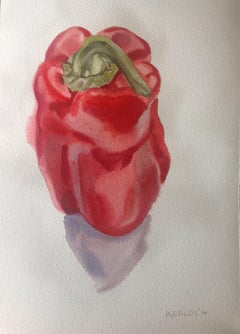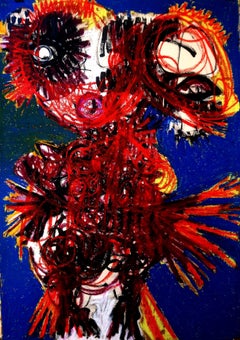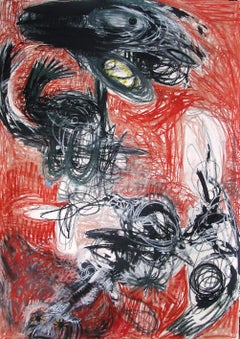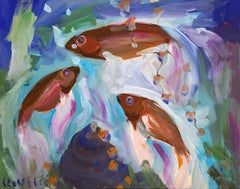Expressionist Drawings and Watercolor Paintings
While “expressionist” is used to describe any art that avoids naturalism and instead employs a bold use of flattened forms and intense brushwork, Expressionist art formally describes early-20th-century work from Europe that drew on Symbolism and confronted issues such as urbanization and capitalism. Expressionist artists experimented in paintings and prints with skewed perspectives, abstraction and unconventional, bright colors to portray how isolating and anxious the world felt rather than how it appeared.
Between 1905 and 1920, Austrian and German artists, in particular, were inspired by Postimpressionists such as Paul Gauguin and Vincent van Gogh in their efforts to strive for a new authenticity in their work. In its geometric patterns and decorative details, Expressionist art was also marked by eclectic sources like German and Russian folk art as well as tribal art from Africa and Oceania, which the movement’s practitioners witnessed at museums and world’s fairs.
Groups of artists came together to share and promote the themes now associated with Expressionism, such as Die Brücke (The Bridge) in Dresden, which included Erich Heckel, Ernst Ludwig Kirchner and Karl Schmidt-Rottluff and investigated alienation and the dissolution of society in vivid color. In Munich, Der Blaue Reiter (The Blue Rider), a group led by Wassily Kandinsky and Franz Marc, instilled Expressionism with a search for spiritual truths. In his iconic painting The Scream, prolific Norwegian painter Edvard Munch conveyed emotional turmoil through his depiction of environmental elements, such as the threatening sky.
Expressionism shifted around the outbreak of World War I, with artists using more elements of the grotesque in reaction to the escalation of unrest and violence. Printmaking was especially popular, as it allowed artists to widely disseminate works that grappled with social and political issues amid this time of upheaval. Although the art movement ended with the rise of Nazi Germany, where Expressionist creators were labeled “degenerate,” the radical ideas of these artists would influence Neo-Expressionism that emerged in the late 1970s with painters like Jean-Michel Basquiat and Francesco Clemente.
Find a collection of authentic Expressionist paintings, sculptures, prints and more art on 1stDibs.
21st Century and Contemporary Expressionist Drawings and Watercolor Paintings
Watercolor
2010s Expressionist Drawings and Watercolor Paintings
Paper, Oil
2010s Expressionist Drawings and Watercolor Paintings
Pastel, India Ink, Cardboard
2010s Expressionist Drawings and Watercolor Paintings
Pastel, Cardboard, India Ink
2010s Expressionist Drawings and Watercolor Paintings
Pastel, India Ink, Cardboard
1920s Expressionist Drawings and Watercolor Paintings
Gouache, Archival Paper
1920s Expressionist Drawings and Watercolor Paintings
Gouache, Archival Paper
2010s Expressionist Drawings and Watercolor Paintings
Pastel, Cardboard, Oil
2010s Expressionist Drawings and Watercolor Paintings
Pastel, India Ink, Cardboard
2010s Expressionist Drawings and Watercolor Paintings
Pastel, Cardboard, Ink
2010s Expressionist Drawings and Watercolor Paintings
Pastel, Oil, Cardboard
2010s Expressionist Drawings and Watercolor Paintings
Paper, Pastel
2010s Expressionist Drawings and Watercolor Paintings
Paper, Pastel
2010s Expressionist Drawings and Watercolor Paintings
Paper, Pastel
2010s Expressionist Drawings and Watercolor Paintings
Paper, Pastel
1920s Expressionist Drawings and Watercolor Paintings
Ink, Watercolor, Pigment
Late 20th Century Expressionist Drawings and Watercolor Paintings
Ink, Pen
1920s Expressionist Drawings and Watercolor Paintings
Charcoal
20th Century Expressionist Drawings and Watercolor Paintings
Watercolor
1980s Expressionist Drawings and Watercolor Paintings
Ink
Early 2000s Expressionist Drawings and Watercolor Paintings
Board, Color Pencil
Early 2000s Expressionist Drawings and Watercolor Paintings
Board, Color Pencil
Early 2000s Expressionist Drawings and Watercolor Paintings
Board, Color Pencil
1940s Expressionist Drawings and Watercolor Paintings
Watercolor
2010s Expressionist Drawings and Watercolor Paintings
Paper, Oil
2010s Expressionist Drawings and Watercolor Paintings
Paper, Oil
2010s Expressionist Drawings and Watercolor Paintings
Canvas, Pastel, Ink
2010s Expressionist Drawings and Watercolor Paintings
Pastel, India Ink, Cardboard
2010s Expressionist Drawings and Watercolor Paintings
Pastel, India Ink, Cardboard
2010s Expressionist Drawings and Watercolor Paintings
Pastel, India Ink, Cardboard
1930s Expressionist Drawings and Watercolor Paintings
Paper, Chalk
1960s Expressionist Drawings and Watercolor Paintings
Watercolor
1970s Expressionist Drawings and Watercolor Paintings
Ink
1940s Expressionist Drawings and Watercolor Paintings
Ink
1920s Expressionist Drawings and Watercolor Paintings
Gouache
1940s Expressionist Drawings and Watercolor Paintings
Watercolor
1940s Expressionist Drawings and Watercolor Paintings
Ink
1940s Expressionist Drawings and Watercolor Paintings
Ink
1940s Expressionist Drawings and Watercolor Paintings
Ink
1960s Expressionist Drawings and Watercolor Paintings
Pastel
1930s Expressionist Drawings and Watercolor Paintings
Ink
1940s Expressionist Drawings and Watercolor Paintings
Ink
1970s Expressionist Drawings and Watercolor Paintings
Ink
1940s Expressionist Drawings and Watercolor Paintings
Ink



